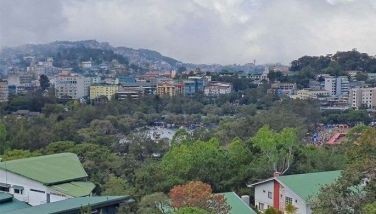Phl may help US fight ISIS
MANILA, Philippines - The Philippines and the United States are discussing the details of possible assistance that Manila can provide in fighting the extremist Islamic State of Iraq and Syria (ISIS) that is reportedly recruiting members in this country, Malacañang said yesterday.
President Aquino was asked several times about the ISIS while in Europe in relation to the security situation in Mindanao.
Aquino, however, said there were no reports of Filipinos having joined the ISIS.
In New York, Aquino said Manila offered to help the US to contain the IS and that Foreign Affairs Secretary Albert del Rosario was set to meet with US State Department officials to discuss this.
Presidential spokesman Edwin Lacierda told a press briefing that the Department of Foreign Affairs would find out from the State Department “what the US needs and what the Philippines can provide.”
“We don’t want to preempt their meeting. So, that’s the discussion right now… they are really meeting precisely to identify what we can do,” he said.
Lacierda said the IS had resorted to “naked cruelty and naked violence” and had posed threats to world security.
“Barbarity beyond human decency, we’ve seen that… they have shown in their videos of incidence of beheading. This is totally unacceptable. And so, we agree with the principle laid out by the US government and a number of countries have joined in this effort…against the ISIS or the ISIL (Islamic State of Iraq and the Levant),” Lacierda said.
Lacierda said the government was continuously addressing the root problems of insurgency, terrorism and extremism and that would include poverty alleviation.
“But, recruiting to ISIS also takes another form… Apart from the (economic) situation… (it’s also about) the religious undertones... it’s also about, perhaps, an extreme zealousness on the beliefs of ISIS, which they adhere to… But, again, we also need to validate all these allegations of so many people joining – Filipinos joining ISIS,” Lacierda said.
He said the government was doing a lot of proactive measures to bring peace and development in Mindanao, particularly through the peace agreement with the Moro Islamic Liberation Front.
“This area has been neglected for so long. We need to step up, we need to provide assistance to this area and that’s why it’s a kind of affirmative action where we bring them up to the level of the other brothers and sisters in other parts of the country. So this is a concrete effort to make sure that we’ve recognized your conditions. We are here to make sure that your conditions improve; and that’s why we work on both peace and order situation, the economic situation,” Lacierda said.
“In fact, when we came up with the Comprehensive Agreement on the Bangsamoro, a number of foreign investors, a number of multilateral institutions have expressed interests because there’s now the possibility of peace in the region. We can bring in investments; we can bring in assistance that can directly aid the people on the ground,” he added.
In a press briefing in New York, Aquino said the Philippines would want to contribute something doable and within the government’s capabilities without posing undue risks through their forces or the country at large.
He said Del Rosario, in his meeting with his American counterparts, would “get more details exactly if they are asking for assistance and what manner of assistance... which we will review.”
Aquino’s statement came as US President Barack Obama appealed to the world “to join in this effort” to fight ISIS.
Obama said more than 40 nations “have offered to join this coalition.”
“In this effort, we do not act alone. Nor do we intend to send US troops to occupy foreign lands. Instead, we will support Iraqis and Syrians fighting to reclaim their communities. We will use our military might in a campaign of air strikes to roll back ISIL. We will train and equip forces fighting against these terrorists on the ground. We will work to cut off their financing, and to stop the flow of fighters into and out of the region,” Obama said in his speech before the United Nations General Assembly on Sept. 24.
The Philippines extended a similar offer to the US in 2003, when then President Gloria Macapagal-Arroyo led the country in joining the US “coalition of the willing” against Iraq.
Filipinos largely rejected Arroyo’s move, a Social Weather Stations survey in 2003 showed, as 63 percent of Filipinos wanted their country “to be neutral in a US-Iraq conflict.”
The US eventually dropped the Philippines from the coalition of the willing. This came after Arroyo withdrew a humanitarian force from Iraq in 2004 “in exchange for the release of Filipino truck driver Angelo de la Cruz who was later freed,” The STAR reported then.
ISIS remains a threat to the Philippines as reports said at least three Filipinos had died fighting along with the extremists.
At the same time, the Abu Sayyaf and the Bangsamoro Islamic Freedom Fighters reportedly declared their allegiance to ISIS.
Sympathizers
On Tuesday, a terrorism-monitoring group reported the Abu Sayyaf threatened to kill one of two German hostages unless a P250-million ($5.62-million, 4.4 million-euro) ransom is paid and Berlin stops supporting the US-led campaign against ISIS.
Sources said the Abu Sayyaf is taking advantage of their German hostages by using civilian sympathizers with links to ISIS militants to raise additional funds out of the latest kidnapping caper.
A security official said the civilians with links to the ISIS were used by the bandit group in uploading at the intelligence networking site, worldanalys.net, the photo of the German couple Stefan Victor Okonek and Herike Disen to show they are under their custody.
“Our reading is that the Abu Sayyaf militants, most have no knowledge about computers, are now using these ISIS-civilian sympathizers in Mindanao, to raise more funds from the Middle-East terrorist group, on top of the P250 million ransom they are asking for the safe release of the two German nationals,” the source said.
Another source in the intelligence community revealed the ISIS sent a team of Egyptian emissaries to Mindanao early this year to recruit Filipino Muslim militants but failed.
“While they failed to recruit Filipinos to join the fight in the Middle East, a number of young Muslim militants became their instant sympathizers back here,” he said.
The Muslim sympathizers, whose group is now known as the Khalifa Islamiyah Mindanao (KIM), underwent basic military training supervised by the Egyptians in the mountains in Lanao del Sur, the official said.
Despite these links, Aquino downplayed the influence of ISIS or IS in the Philippines.
He said the Philippines still faces the same problems: terrorist groups like the Abu Sayyaf and the BIFF, which “are doing basically the same things, but now attributing it to their joining IS, which doesn’t necessarily mean that they are IS.”
In any case, Aquino said the Philippines is ensuring the security against ISIS of world leaders set to visit the country in the Asia-Pacific Economic Cooperation summit in late 2015, and Pope Francis from Jan. 15 to 19, 2015.
Aquino said he wanted the Presidential Security Group, for one, to “double the effort, especially for the head of the Holy Mother Church.”
“There shouldn’t be any incident while he’s in our country,” Aquino said, as Francis is reportedly facing threats from ISIS in Vatican City.
No confirmation
In various forums in Europe, Aquino said reports of Filipinos joining the ISIS were unverified.
“And our intelligence reports tell us that they are not based on actual contact nor coordination with the same,” Aquino said.
“It is an attempt to enhance their own status, especially for those that are increasingly being marginalized,” he added.
Aquino said the MILF, which probably had some links to al-Qaeda before, was actually “our partners in obtaining peace for the Bangsamoro peoples and have actually entered into an agreement with the national government.”
“This has been translated into a law. The law is now before our Congress. We are waiting for its passage and ratification and a plebiscite that will put the MILF in a governing role in the transition period leading up to the national elections. As partners and eventually as people who will be responsible for the peace and order in that portion of the country, even now they have been helping us address the issues of, well, a lot of times bandits, and sometimes potentially terrorists,” Aquino said.
“They have publicly stated that they are not in support of what ISIS is doing and they will prevent the ISIS intrusion into Philippine affairs,” he said.
Aquino said these problems were rooted in lack of economic opportunities rather than based on ideologies or even religious extremism.
“So, for instance, I am not aware of any instance where we had suicide bombers in the Philippines. That doesn’t mean that we will not be subjected to the same; that doesn’t mean that we don’t have the potentials of being infiltrated by terrorist but it is now within our culture to do so,” he said.
Aquino said addressing the root causes of the problem would enhance the government’s ability to insulate or at least protect the country’s borders from nihilistic influences.
“The Moro Islamic Liberation Front, which is the party that has the fighters that we have engaged with, have themselves stated that they are resisting ISIS encroachment into the Bangsamoro,” he said.
With the forging of the agreement with the MILF, Aquino said his government was expecting partners to be taking on the policing role and at the same time, engaging in normalization or the laying down of weapons as a principle in terms of maintaining peace and order.
He said the MILF is culturally immersed, knowing all the players in the region.
“They seem to be – they’re situated there. There’s no remote control aspect. So we subscribed to them… We subscribe to the idea that empowering them resolves a lot of these long-standing conflicts,” he said.
“Now, there are reports coming from our neighbors that say that like other countries they suspect some of their citizens of having gone to the conflict areas either of Iraq or Syria, mostly by way of Turkey, according to the reports that we have been getting,” Aquino said.
Aquino said they have no hard evidence indicating Filipinos have joined ISIS.
“We do recognize the threat that we have a very significant population in the Middle East. In just two countries alone, where the major concentration is, in the neighborhood of something like 1.2 million who might be recruited, might be brainwashed by their good organizers. But we are very conscious of that.
We would not have... for instance suicide bombing in our country. It is not part of the culture,” Aquino said.
Despite all efforts to dissuade people from joining insurgents, terrorists or extremists, Aquino said officials “will not let our hands down.”
“We will continue to guard because this threat is a threat that we all face. The inability to dialogue, the inability to be reasonable, to have logic as an operative mode of discussions should really bother any and all of us,” Aquino said. – Aurea Calica, Jaime Laude
- Latest
- Trending































